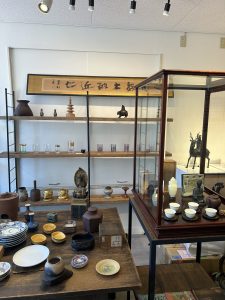「文化」の意味とは?(愛知県名古屋市千種区姫池通 骨董買取 古美術風光舎)
2025.11.03

本日文化の日は晴れの特異日の一つとされています。朝の雨空から一転、清々しい晴れ間が広がり、久しぶりに虹も見ることができました。本日は日本各地で美術館や展覧会の観覧料が無料になるところが多いとのこと。足を運ばれた方はいらっしゃるでしょうか。
文化の日はもともと明治天皇の誕生日で、大正時代には「明治節」と呼ばるようになり、戦後「自由と平和を愛し、文化をすすめる日」として「文化の日」と定められました。
文化の日が誕生日という友人がいて、誕生日が毎年休日だなんてラッキーだし知的な感じ。などと羨ましく思っておりましたが、今朝のニュースで「文化勲章」などの表彰者の名前が発表されるのを観ながら、ところで「文化」って何?と今さらながら疑問が湧いてきました。思えば「文化」が付く言葉は膨大にあります。日本文化、文化財、文化的生活、文化人、文化祭、オタク文化…等々。そういえば一昔前、俳優の石田純一さんの発言が誇大解釈されニュースのタイトルにもなった「文化」もありましたね。
「文化」はもともとは中国の古典文学に由来し、「文治教化」という言葉の中で、文=学問や礼儀、化=教え導くことを意味し、刑罰や武力ではなく、学問や教育によって人々を導くことを表しています。 日本では平安時代の貴族社会において文学や芸術の発展とともに「文化」という言葉が広まったとされています。
明治時代には少し意味合いが変化し、西洋の技術や思想を取り入れる「文明開化」を「文化」として捉える時期があり、さらに戦後、英語のculture=カルチャーを「文化」と翻訳したことから更に意味は広がっていき、文化の意味の定義が複雑になっているのだとか。
現在の文化の用いられ方としては大まかに2通りあり、「文化人」などに用いられるように、豊かなもの、知的水準の高いものという「知性」「教養」「芸術」などを意味するもの。もうひとつは「日本文化」などに用いられるように集団により共有、伝達され、歴史的に形成された「言語」「道徳」などの生活様式を意味するものとされています。
話は変わりますが、昨日のアメリカのワールドシリーズの最終戦は盛り上がりましたね。日本人選手の活躍に感動し楽しませてもらいました。優勝したドジャースの祝賀会でインタビューを受けていた選手が「自分が目立つのではなくチームのために貢献しようという文化(culture)がチームに根付いていることが勝因のひとつです」と話していました。この文化には2年前に入団した大谷翔平選手の影響が大きいとのこと。味方への配慮だけでなく、敵対心をむき出しにする人をも理解し受け入れようとする姿は文化の垣根を越えて人の心を揺さぶる力があるようです。同じ日本人として誇らしく、学ぶところが多いです。今ではドジャースの選手の名前をほとんど言えてしまう自分が大谷選手に一番影響されているのかもしれませんが。
それでは、また次の機会に。(スタッフH)
Today, Culture Day, is considered one of the days with a peculiar tendency for clear weather. After a rainy morning sky, refreshing clear skies spread out, and we even saw a rainbow for the first time in a long while. It seems many museums and exhibitions across Japan are offering free admission today. Did any of you happen to visit?
Culture Day was originally Emperor Meiji’s birthday. During the Taisho era, it became known as “Meiji Festival.” After the war, it was designated as “Culture Day” to be a day “cherishing freedom and peace, and promoting culture.”
I have a friend whose birthday falls on Culture Day. I used to envy them, thinking how lucky they were to have their birthday on a holiday every year, and how intellectual it sounded. But watching this morning’s news announcing the recipients of the Order of Culture and other awards, I suddenly wondered, “What exactly is ‘culture’?” Looking back, there are countless words containing “culture”: Japanese culture, cultural properties, cultural life, cultural figures, cultural festivals, otaku culture… and so on. Come to think of it, there was also that “culture” from a while back when actor Junichi Ishida’s remarks were blown out of proportion and made headlines.
The term “culture” originally comes from classical Chinese literature. Within the phrase “wen zhi jiao hua” (文治教化), ‘wen’ means learning or etiquette, and “hua” means to teach and guide. It represents guiding people through learning and education, rather than through punishment or force. In Japan, the term “culture” is said to have spread during the Heian period alongside the development of literature and the arts within aristocratic society.
During the Meiji era, the meaning shifted somewhat. There was a period when “civilization and enlightenment” (文明開化), the adoption of Western technology and ideas, was perceived as “culture.” Furthermore, after the war, translating the English word “culture” as ‘文化’ broadened its meaning even more, making the definition of “culture” complex.
Today, the term “culture” is broadly used in two ways: one meaning refers to rich, intellectually sophisticated, or artistic elements like “intellect,” “cultivation,” or “art,” as seen in terms like “cultural figure.” The other meaning refers to shared, transmitted, historically formed ways of life within a group, such as ‘language’ or “morals,” as seen in terms like “Japanese culture.”
Changing the subject, yesterday’s final game of the American World Series was thrilling, wasn’t it? I was moved and thoroughly entertained by the Japanese players’ performances. During the Dodgers’ victory celebration, one player interviewed mentioned, “One reason for our win is the culture rooted in our team – the mindset of contributing for the team rather than seeking personal glory.” It seems Shohei Ohtani, who joined the team two years ago, has had a significant influence on fostering this culture. His attitude—not only considering teammates but also seeking to understand and accept even those who show open hostility—seems to have the power to move people across cultural barriers. As a fellow Japanese person, I feel proud and have much to learn. I might be the one most influenced by Ohtani, as I can now name almost all the Dodgers players.
Well then, until next time. (Staff H)
*******************
ご実家の整理やお片付けなどをされている方のご相談などが多くございます。
お片付けなどくれぐれもご無理のないようになさってくださいませ。
風光舎では古美術品や骨董品の他にも絵画や宝石、趣味のお品など様々なジャンルのものを買受しております。
お片付けをされていて、こういうものでもいいのかしらと迷われているものでも、どうぞお気軽にご相談下さいませ。
また風光舎は、出張買取も強化しております。ご近所はもちろん、愛知県内、岐阜県、三重県その他の県へも出張いたします。
なお、毎月21日の持込鑑定会では無料鑑定・買取・ご相談など、ご予約なしで承っております。
ご近所の皆さま、ご遠方のみなさまも、お気軽にお越しくださいませ。
まずは、お電話お待ちしております。
愛知県名古屋市千種区姫池通
骨董 買取【古美術 風光舎 名古屋店】
TEL052(734)8444
10:00-18:00 OPEN
#出張買取#骨董#古美術#骨董品#絵画#版画#茶道具#刀剣#彫刻

